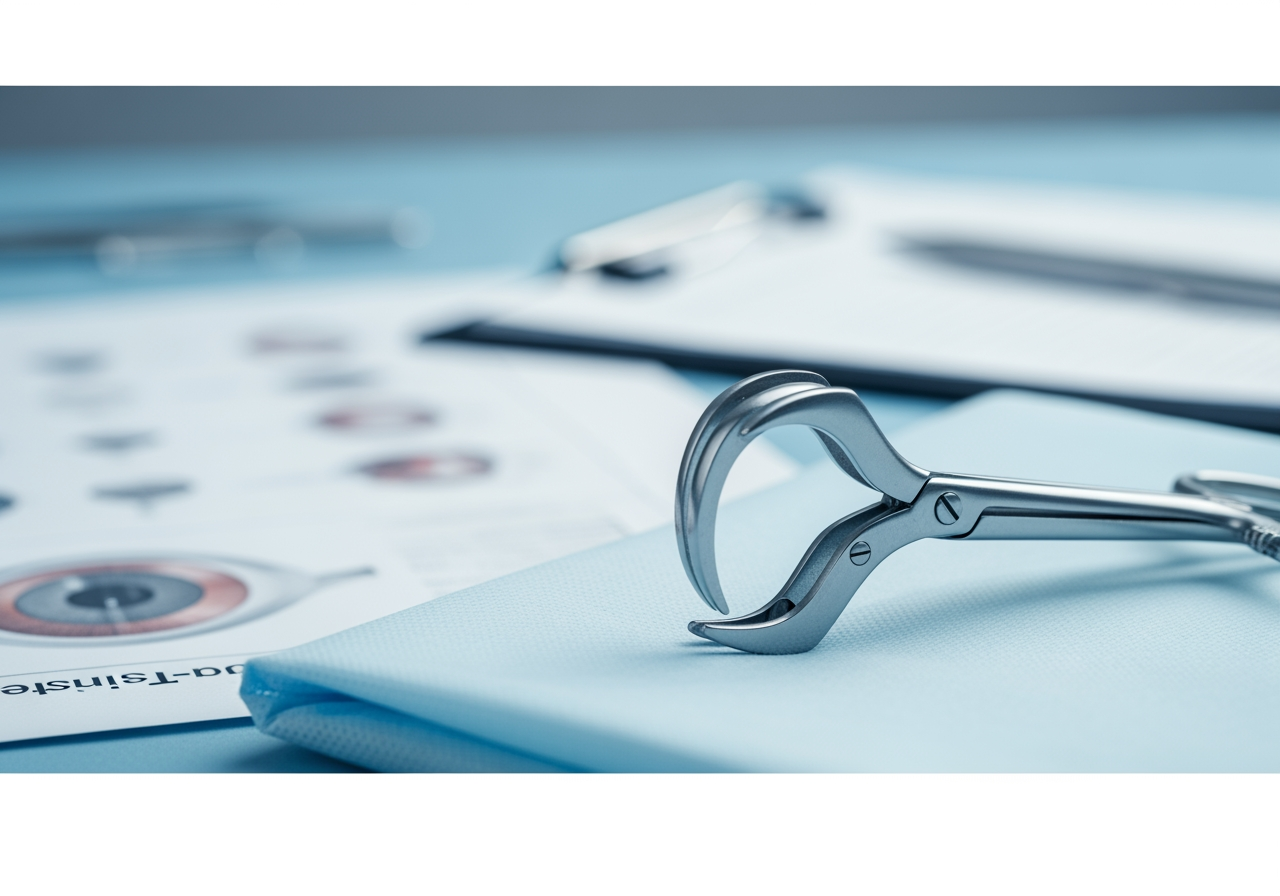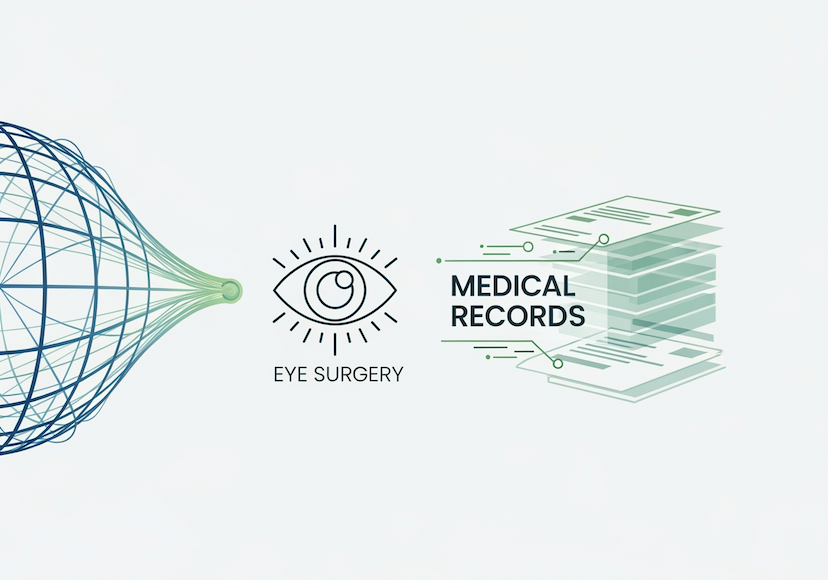
Top Pre-Surgery Tests Required for Eye Surgery
16 Nov, 2025
 Healthtrip
Healthtrip- Why Pre-Operative Assessment is Crucial Before Eye Surgery
- Complete Blood Count (CBC): What It Reveals About Your Health
- Comprehensive Eye Exam: A Detailed Look at Your Vision
- Corneal Topography: Mapping the Surface of Your Eye - Available At Breyer, Kaymak & Klabe Augenchirurgie
- Ocular Coherence Tomography (OCT): Imaging the Retina - Offered at Vejthani Hospital
- Intraocular Lens (IOL) Calculation: Planning for Vision Correction - Memorial Sisli Hospital Expertise
- Conclusion
Comprehensive Eye Examination
A thorough eye examination is the cornerstone of pre-surgery assessment. This isn't your routine vision check; it's a deep dive into every aspect of your eye health. Your doctor, potentially at a facility like Fortis Hospital, Noida or Yanhee International Hospital in Bangkok, will assess your visual acuity, measure refractive errors (like nearsightedness, farsightedness, or astigmatism), and evaluate the overall health of your cornea, lens, and retina. Special attention is given to identifying any pre-existing conditions like cataracts, glaucoma, or macular degeneration that might impact the surgical plan or outcome. Furthermore, the examination meticulously assesses the pressure inside your eye (intraocular pressure) to rule out any signs of glaucoma. This comprehensive evaluation helps tailor the surgical approach to your unique needs, maximizing the chances of a positive and lasting result. Remember, a detailed understanding of your eye's condition is the first step toward a successful surgery.
Most popular procedures in India
Corneal Topography
Imagine your cornea as a landscape, and corneal topography as the detailed map that reveals its every contour. This non-invasive imaging technique creates a precise three-dimensional map of the cornea's surface, identifying any irregularities, scars, or distortions. This information is vital for procedures like LASIK or PRK, where the cornea is reshaped to correct vision. By analyzing the corneal topography, your surgeon, potentially working at a hospital such as Breyer, Kaymak & Klabe Augenchirurgie in Düsseldorf or Quironsalud Hospital Murcia, can ensure that you are a suitable candidate for the procedure and customize the treatment plan to your specific corneal shape. Detecting conditions like keratoconus (a progressive thinning of the cornea) is crucial to prevent complications and optimize visual outcomes. Think of corneal topography as the architect's blueprint, guiding the surgeon in sculpting your cornea for optimal vision. Healthtrip can assist you in finding facilities with advanced diagnostic equipment for accurate corneal assessment.
Wellness Treatments
Give yourself the time to relax
Lowest Prices Guaranteed!

Lowest Prices Guaranteed!
Optical Coherence Tomography (OCT)
Optical Coherence Tomography (OCT) is like having a microscopic window into the layers of your retina. This non-invasive imaging technique uses light waves to create high-resolution cross-sectional images of the retina, optic nerve, and other important structures in the back of your eye. It's a game-changer for diagnosing and monitoring conditions like macular degeneration, diabetic retinopathy, and glaucoma. Before surgery, OCT helps your ophthalmologist,possibly at a hospital such as Singapore General Hospital or Saudi German Hospital Cairo, Egypt, assess the health of your retina and optic nerve, ruling out any underlying issues that might affect the surgical outcome. For instance, it can detect subtle retinal thickening or fluid accumulation that might warrant further investigation or treatment before proceeding. In essence, OCT provides invaluable insights into the inner workings of your eye, ensuring that your surgeon has a comprehensive understanding of its health before making any surgical decisions. Healthtrip can connect you with hospitals equipped with state-of-the-art OCT technology for precise retinal imaging.
Pupil Dilation and Examination
Dilating your pupils allows your eye doctor, perhaps at Pantai Hospital Kuala Lumpur, Malaysia or NMC Specialty Hospital, Al Nahda, Dubai, to get a much wider and clearer view of the back of your eye. Think of it as opening a curtain to reveal the entire stage. By using special eye drops to temporarily enlarge your pupils, the doctor can thoroughly examine the retina, optic nerve, and blood vessels. This is crucial for identifying any signs of retinal tears, detachments, or other abnormalities that could impact your vision. It's especially important if you have a history of diabetes, high blood pressure, or other conditions that can affect the blood vessels in your eye. While the dilation might cause temporary light sensitivity and blurred vision, it's a small price to pay for the wealth of information it provides. This examination ensures that your surgeon has a complete picture of your eye's health before proceeding, minimizing the risk of complications and optimizing the chances of a successful outcome. Healthtrip can help you find experienced ophthalmologists who perform thorough dilated eye exams.
Biometry
Biometry is like measuring the precise dimensions of your eye to ensure the perfect fit for an intraocular lens (IOL) during cataract surgery. This test uses ultrasound or laser technology to measure the length of your eye, the curvature of your cornea, and other key parameters. These measurements are then used to calculate the optimal power of the IOL that will be implanted during surgery. The goal is to select an IOL that will provide you with the best possible vision after surgery, minimizing your dependence on glasses or contact lenses. Accurate biometry is essential for achieving optimal refractive outcomes, and it's a critical step in the pre-operative process. Facilities such as London Medical and Taoufik Hospitals Group, Tunisia offer advanced biometry techniques. Think of biometry as the tailor's measuring tape, ensuring that your new lens is perfectly tailored to your eye. Healthtrip can guide you to clinics with skilled technicians and advanced biometry equipment.
Blood Tests and General Health Assessment
Eye surgery isn't just about your eyes; it's also about your overall health. Blood tests and a general health assessment play a vital role in ensuring your safety during and after the procedure. Blood tests can reveal underlying conditions like diabetes, high blood pressure, or bleeding disorders that could increase your risk of complications. Your doctor, possibly working at a hospital such as Cleveland Clinic London or Hegde Hospital, will also review your medical history, medications, and allergies to identify any potential risks. This comprehensive evaluation helps the surgical team take necessary precautions and adjust the surgical plan to minimize any potential problems. For instance, if you have diabetes, your blood sugar levels will need to be carefully controlled before surgery. Similarly, if you're taking blood thinners, you might need to temporarily stop them to reduce the risk of bleeding. This holistic approach ensures that your body is well-prepared for surgery, maximizing your chances of a smooth recovery. Healthtrip can connect you with medical professionals who prioritize your overall well-being throughout the surgical process.
Why Pre-Operative Assessment is Crucial Before Eye Surgery
Embarking on a journey towards better vision through eye surgery is a significant decision, and like any important journey, it requires careful planning and preparation. That's where pre-operative assessment comes in – it's not just a routine formality, but a crucial step that ensures the best possible outcome for your vision and overall well-being. Think of it as a comprehensive health check-up specifically tailored to your eyes and your individual health profile. It’s about understanding the landscape before we build on it, ensuring the foundation is solid and ready for the procedure. A thorough pre-operative assessment helps your surgeon understand your specific eye condition, identify any potential risks or complications, and ultimately customize the surgical plan to meet your unique needs. It’s like having a detailed roadmap before starting a long drive, minimizing the chances of unexpected detours or roadblocks. Hospitals like Saudi German Hospital Cairo, Egypt emphasize the need for such thorough assessments, and Healthtrip facilitates access to world-class pre-operative diagnostics.
The pre-operative assessment typically includes a series of tests and examinations designed to evaluate various aspects of your eye health. This might involve measuring your corneal thickness, assessing the health of your retina, and checking for any signs of glaucoma or other underlying conditions. Your medical history is also carefully reviewed to identify any pre-existing health issues or medications that could potentially impact the surgery or recovery process. This is where honesty and open communication with your medical team are absolutely essential. It's not about judgment, it's about ensuring your safety and optimizing the success of the procedure. Imagine it like this: if you're planning to paint a wall, you wouldn't just slap on the paint without first checking for any cracks, holes, or damp spots. Similarly, a pre-operative assessment helps identify any "cracks" or "holes" in your eye health that need to be addressed before proceeding with surgery. Furthermore, you will have a detailed discussion with your ophthalmologist about the type of surgery you require, the expected outcomes, and potential risks. They will answer all of your questions and address any concerns you might have; ensuring peace of mind is a very important aspect during this phase.
Ultimately, the pre-operative assessment is an investment in your future vision. It’s a commitment to ensuring that you receive the safest, most effective, and most personalized care possible. By taking the time to undergo a comprehensive evaluation, you're empowering your surgical team with the information they need to make informed decisions and deliver the best possible results. Consider it as a collaborative effort between you and your healthcare providers, working together to achieve a shared goal: restoring or improving your vision and enhancing your quality of life. Healthtrip understands the importance of this process and assists in finding the best hospitals such as NMC Specialty Hospital, Al Nahda, Dubai and specialists to guide you through each step, ensuring you feel confident and well-informed every step of the way. So, remember, a thorough pre-operative assessment is not just a recommendation – it’s a necessity for a successful and rewarding eye surgery experience.
Complete Blood Count (CBC): What It Reveals About Your Health
A Complete Blood Count, or CBC, is one of the most common and versatile blood tests ordered by doctors. It's a bit like a snapshot of your overall health, providing valuable insights into the different types and quantities of cells circulating in your blood. It's a simple yet powerful tool that can help detect a wide range of conditions, from infections and anemia to more serious disorders like leukemia. Think of it as your body's internal census, counting and categorizing the different types of cells that make up your blood. The information gleaned from a CBC can help your doctor diagnose illnesses, monitor your response to treatment, and even provide clues about your overall health status. It’s often a key part of the pre-operative assessment, which may be required before eye surgery at facilities like Vejthani Hospital.
So, what exactly does a CBC measure? The test typically evaluates three main types of blood cells: red blood cells (RBCs), white blood cells (WBCs), and platelets. RBCs are responsible for carrying oxygen throughout your body, and a CBC measures their number, size, and hemoglobin content (the protein that carries oxygen). Abnormalities in RBCs can indicate anemia, a condition where your body doesn't have enough healthy red blood cells to carry adequate oxygen to tissues. WBCs are your body's defense force, fighting off infections and other invaders. A CBC measures the total number of WBCs, as well as the different types of WBCs (such as neutrophils, lymphocytes, and monocytes), and those types of cells help determine abnormalities, infections, and autoimmune issues. Platelets are small cell fragments that help your blood clot, preventing excessive bleeding. A CBC measures the number of platelets in your blood, and abnormalities can increase risk of bleeding or clotting disorders. In essence, the CBC provides a comprehensive overview of your blood cells, allowing your doctor to identify any imbalances or abnormalities that may require further investigation.
The results of a CBC can be interpreted in conjunction with your medical history, physical exam, and other diagnostic tests to arrive at an accurate diagnosis and treatment plan. It's important to remember that a CBC is just one piece of the puzzle, and your doctor will consider all the available information to provide you with the best possible care. While it can be an indicator of an issue, abnormal results can also be caused by factors like medication or diet. Also, it's worth noting that a CBC is a relatively quick and painless procedure, involving a simple blood draw from a vein in your arm. The results are usually available within a few hours, providing your doctor with valuable information to guide your care. Healthtrip connects patients with advanced diagnostic services and medical expertise available at hospitals like Fortis Memorial Research Institute, Gurgaon, ensuring access to thorough health assessments. Understanding what a CBC entails can empower you to be more informed and proactive about your health.
Comprehensive Eye Exam: A Detailed Look at Your Vision
More than just a quick check to see if you need new glasses, a comprehensive eye exam is a thorough evaluation of your overall eye health. It goes beyond simply measuring your visual acuity and delves into the intricate structures of your eyes to detect any potential problems early on. Think of it as a regular maintenance check for your eyes, ensuring that everything is functioning properly and catching any minor issues before they become major headaches. Early detection is key when it comes to eye health, as many eye diseases can develop silently without any noticeable symptoms in their early stages. A comprehensive eye exam can help identify these problems early on, allowing for timely intervention and preventing potential vision loss. Hospitals such as Yanhee International Hospital emphasize the significance of regular comprehensive eye exams. Healthtrip ensures that patients have access to a wide range of eye care specialists.
So, what can you expect during a comprehensive eye exam? The exam typically includes a variety of tests and procedures designed to assess different aspects of your vision and eye health. Your vision will be tested at both near and far distances to determine if you have any refractive errors, such as nearsightedness, farsightedness, or astigmatism. The eye doctor will use various instruments to examine the internal structures of your eyes, including the retina, optic nerve, and lens. These instruments may include an ophthalmoscope, which allows the doctor to view the back of your eye, and a slit lamp, which provides a magnified view of the front of your eye. The pressure inside your eyes will also be measured to check for glaucoma, a condition that damages the optic nerve and can lead to vision loss. Other tests may be performed to assess your color vision, depth perception, and peripheral vision. The doctor will look for issues such as cataracts, macular degeneration, and diabetic retinopathy. By examining all these aspects, a comprehensive eye exam provides a complete picture of your eye health.
The frequency of comprehensive eye exams depends on various factors, including your age, medical history, and family history of eye disease. In general, adults should have a comprehensive eye exam every one to two years, while children should have their eyes checked at least once during infancy and again before starting school. Those with risk factors for eye disease, such as diabetes or high blood pressure, may need more frequent exams. Regular comprehensive eye exams are an essential part of maintaining good eye health and preserving your vision. Think of it as an investment in your future, ensuring that you can continue to enjoy clear, comfortable vision for years to come. Partnering with Healthtrip can aid patients in accessing advanced eye care and specialist services in well-reputed facilities such as Breyer, Kaymak & Klabe Augenchirurgie, where detailed comprehensive eye exams are a routine part of the diagnostic process.
Also Read:
Corneal Topography: Mapping the Surface of Your Eye - Available At Breyer, Kaymak & Klabe Augenchirurgie
Imagine your eye as a landscape, with its unique hills and valleys. Corneal topography is like creating a detailed map of that landscape, specifically focusing on the cornea, the clear front surface of your eye. This mapping process is crucial before any eye surgery, especially procedures like LASIK or cataract surgery. Why? Because the shape and health of your cornea directly impact the outcome of these surgeries. Think of it as checking the foundations before building a house; you want to make sure everything is stable and structurally sound. Corneal topography uses advanced technology to measure the curvature, elevation, and power of the cornea at thousands of points. This data is then compiled into a color-coded map, providing a comprehensive visual representation of the cornea's surface. Any irregularities, such as astigmatism, keratoconus (a progressive thinning of the cornea), or scarring, become immediately apparent. This information allows surgeons to tailor the surgical plan to the individual patient, optimizing results and minimizing potential complications. Breyer, Kaymak & Klabe Augenchirurgie in Düsseldorf, Germany, uses state-of-the-art corneal topography equipment to ensure the highest level of precision and safety for their patients. If you're considering eye surgery, understanding the importance of corneal topography is the first step towards achieving the best possible vision correction. Healthtrip can connect you with world-class facilities like Breyer, Kaymak & Klabe Augenchirurgie, making your journey to better vision smoother and more informed.
Ocular Coherence Tomography (OCT): Imaging the Retina - Offered at Vejthani Hospital
Think of your retina as the film in a camera – it's the light-sensitive tissue at the back of your eye that captures images and sends them to your brain. Ocular Coherence Tomography, or OCT, is like an advanced ultrasound for your eye, allowing doctors to see beneath the surface of the retina in incredible detail. Unlike a regular eye exam that only examines the surface, OCT uses light waves to create cross-sectional images of the retina, revealing its intricate layers and structures. This non-invasive imaging technique can detect a wide range of eye conditions, including macular degeneration, diabetic retinopathy, glaucoma, and retinal detachments, often before any symptoms even appear. Early detection is key to successful treatment, and OCT provides invaluable insights that can help preserve your vision. Imagine being able to catch a small leak in your roof before it causes major damage – that's what OCT does for your eyes. Vejthani Hospital in Bangkok, Thailand, offers comprehensive OCT imaging services, ensuring their patients receive the most accurate diagnoses and personalized treatment plans. From identifying subtle changes in retinal thickness to monitoring the effectiveness of ongoing treatments, OCT is an indispensable tool for modern eye care. If you're looking for cutting-edge diagnostic capabilities, Vejthani Hospital, facilitated by Healthtrip, might be your choice for a thorough eye health assessment. It’s like getting a high-resolution peek at the inner workings of your eye, ensuring everything is in tip-top shape.
Intraocular Lens (IOL) Calculation: Planning for Vision Correction - Memorial Sisli Hospital Expertise
Cataract surgery is like replacing a cloudy window (your natural lens) with a new, clear one (an intraocular lens or IOL). But finding the right IOL is not as simple as picking one off the shelf. It requires careful calculations to ensure the best possible vision after surgery. Intraocular Lens (IOL) calculation is the process of determining the precise power of the artificial lens that will be implanted into your eye during cataract surgery. This calculation takes into account various factors, including the curvature of your cornea, the length of your eye, and your desired refractive outcome (whether you want to see clearly at distance, near, or both). Think of it like tailoring a suit – you need precise measurements to ensure a perfect fit. Inaccurate IOL calculations can lead to blurry vision, the need for glasses after surgery, or even additional corrective procedures. Memorial Sisli Hospital in Istanbul, Turkey, is renowned for its expertise in IOL calculations, utilizing advanced biometry equipment and sophisticated formulas to achieve optimal visual outcomes. This expertise minimizes the chance of refractive surprises and maximizes the likelihood of clear, comfortable vision after cataract surgery. They use advanced technology to assess the unique characteristics of your eye, enabling them to select the IOL that will provide you with the best possible vision. By choosing Memorial Sisli Hospital, facilitated by Healthtrip, you're entrusting your vision to experienced professionals who prioritize precision and patient satisfaction. It's all about ensuring that your new "window" provides you with the clearest view possible.
Also Read:
Conclusion
Navigating the world of eye surgery can feel overwhelming, but understanding the crucial pre-operative assessments empowers you to make informed decisions about your care. From the detailed mapping of your cornea with topography at facilities like Breyer, Kaymak & Klabe Augenchirurgie, to the in-depth retinal imaging offered through OCT at Vejthani Hospital, and the precise IOL calculations at Memorial Sisli Hospital, each step is designed to optimize your vision and ensure the best possible outcome. These advanced technologies, combined with the expertise of skilled ophthalmologists, are revolutionizing eye care and providing patients with clearer, healthier vision. Healthtrip is here to guide you through this journey, connecting you with world-class hospitals and specialists who prioritize your well-being. Whether you're considering LASIK, cataract surgery, or any other vision correction procedure, remember that thorough pre-operative assessments are the foundation for success. By understanding the purpose and benefits of these tests, you can actively participate in your treatment plan and achieve the vision you've always dreamed of. Don't hesitate to explore the options available and take the first step towards a brighter, clearer future with Healthtrip as your trusted partner. The world of advanced eye care awaits, ready to bring clarity and confidence back into your life.
Related Blogs

Common Myths About Eye Surgery Doctors Bust Them
Explore evaluations, innovations, hospital comparisons, and global success insights for

How Healthtrip Coordinates Cross-Border Medical Records for Eye Surgery
Explore evaluations, innovations, hospital comparisons, and global success insights for

Why India Leads in Affordable Eye Surgery Analysis
Explore evaluations, innovations, hospital comparisons, and global success insights for

Patient Satisfaction Scores for Eye Surgery at Healthtrip Partner Hospitals
Explore evaluations, innovations, hospital comparisons, and global success insights for

How to Choose the Right Hospital for Eye Surgery Using Healthtrip's Criteria
Explore evaluations, innovations, hospital comparisons, and global success insights for

Latest Global Innovations in Eye Surgery Now Available in India
Explore evaluations, innovations, hospital comparisons, and global success insights for










